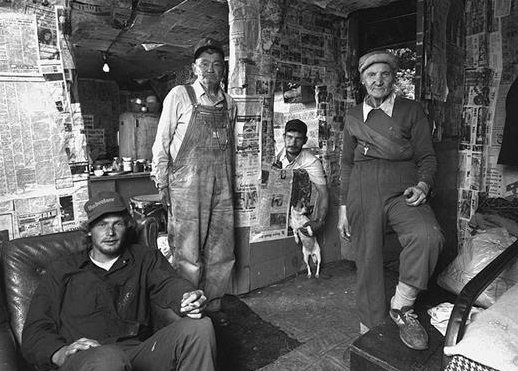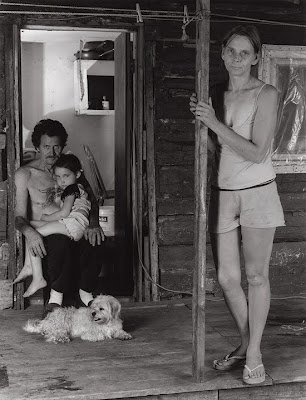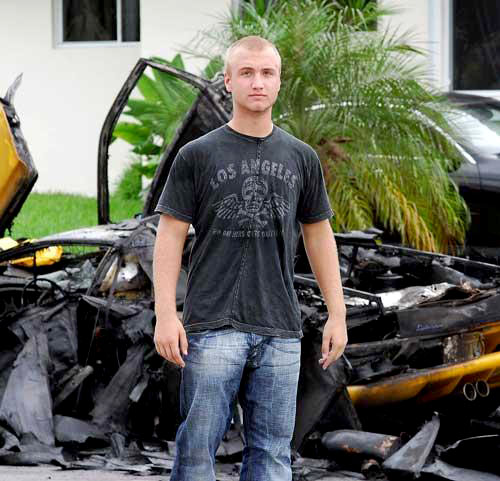





Modern day white "savages" from the apalachians. Whole daily life is focused on direct survival and family. Just like other savages living in the jungle.
Now, occidental "elites", everyone would want to be;














To Be a Human Being (1989-90)
The philosopher Peter Wessel Zapffe in his 90th year (1990 Documentary, Tromsø Norway: Original Film AS)
Each new generation asks – What is the meaning of life? A more fertile way of putting the question would be – Why does man need a meaning to life?
Man is a tragic animal. Not because of his smallness, but because he is too well endowed. Man has longings and spiritual demands that reality cannot fulfill. We have expectations of a just and moral world. Man requires meaning in a meaningless world.
The seed of a metaphysical or religious defeat is in us all. For the honest questioner, however, who doesn’t seek refuge in some faith or fantasy, there will never be an answer.
We come from an inconceivable nothingness. We stay a while in something which seems equally inconceivable, only to vanish again into the inconceivable nothingness.
The immediate facts are what we must relate to. Darkness and light, beginning and end.
Death is a terrible provocation. It appears almost everywhere, presenting a stern but effective scale for both values and ethical standards.
Death is the most certain and the most uncertain event there is.
In accordance with my conception of life, I have chosen not to bring children into the world. A coin is examined, and only after careful deliberation, given to a beggar, whereas a child is flung out into the cosmic brutality without hesitation.
Mankind ought to end its existence of its own will.
I myself am no longer very much afflicted by the thought of my own death. The synthesis, Peter Wessel Zapffe, did not originate until 1899. It was spared from immediate participation in the horrors of the previous years, and it will not miss what awaits mankind at the end of its vertiginous madness.
If one regards life and death as natural processes, the metaphysical dread vanishes, and one obtains "peace of mind".
Zapffe's theory is that humans are born with an overdeveloped skill (understanding, self-knowledge) which does not fit into nature's design. The human craving for justification on matters such as life and death cannot be satisfied, hence humanity has a need that nature cannot satisfy. The tragedy, following this theory, is that humans spend all their time trying not to be human. The human being, therefore, is a paradox.
In The Last Messiah Zapffe described four principal defense mechanisms that humankind uses to avoid facing this paradox:
Isolation is "a fully arbitrary dismissal from consciousness of all disturbing and destructive thought and feeling".[1]
Anchoring is the "fixation of points within, or construction of walls around, the liquid fray of consciousness".[1] The anchoring mechanism provides individuals a value or an ideal that allows them to focus their attentions in a consistent manner. Zapffe also applied the anchoring principle to society, and stated "God, the Church, the State, morality, fate, the laws of life, the people, the future"[1] are all examples of collective primary anchoring firmaments.
Distraction is when "one limits attention to the critical bounds by constantly enthralling it with impressions".[1] Distraction focuses all of one's energy on a task or idea to prevent the mind from turning in on itself.
Sublimation is the refocusing of energy away from negative outlets, toward positive ones. The individual distances him / herself and looks at their existence from an aesthetic point of view (e.g., writers, poets, painters.) Zapffe himself pointed out that his produced works were the product of sublimation.
Zapffe was a prolific mountaineer and took a very early interest in environmentalism. This form of nature conservationism sprung from the intent, not of protecting nature, but to avoid human culturalization of nature. He is the author of many humorous short stories about climbing and other adventures in nature.
[edit] Personal
Zapffe was married twice. He remained married to his second wife Berit Zapffe until his death in 1990. Berit herself died in May 2008. Zapffe believed that having children should be problematised and remained childless by choice.